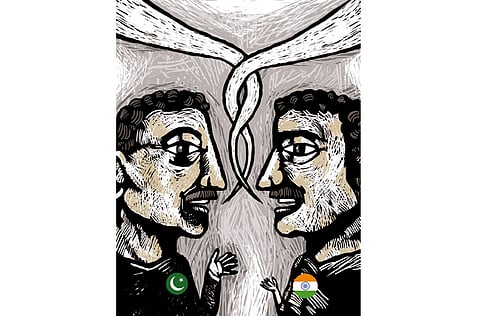Rivals make a positive start
Though not much substance was achieved, or expected, the foreign ministers of Pakistan and India showed sincerity

After a delay of nearly two years, the foreign ministers of Pakistan and India met in Islamabad on July 15. Since the Mumbai tragedy in November 2008, the peace process dialogue begun in January 2004 had been frozen by India.
At the South Asian Association for Regional Cooperation Summit in Bhutan, both democratically elected prime ministers agreed that their foreign ministers would meet to chart the way forward and discuss all issues.
Both governments and peoples are now grappling with the aftermath on the day after. What took place; what is the outcome; was it expected; were the foreign ministers well prepared, supported or constrained by their bureaucracies; what comes next; what lessons can be learned?
Both ministers elaborated their positions and expectations. The Indian minister concentrated on terrorism. The Pakistani minister reiterated that Pakistan would not allow its soil to be used against India, and conveyed deep concern at Indian destabilisation activities through Afghanistan into the Federally Administered Tribal Areas and Balochistan.
Hafiz Saeed, whatever he said, was not an official — unlike the Indian home secretary, who a day before the talks had made an irresponsible statement. Responding to Indian claims of infiltration across the Line of Control he declared government policy was to prevent infiltration. India should address the continuing human-rights violations that were again igniting discontent in Kashmir.
Kashmir on hold
The Indian proposal to restart Kashmir negotiations along their preferred Musharraf model met the response that till the entire dialogue process was recommenced such talks would not resume — the back channel could only work in tandem with the front channel.
Substance was not expected as this meeting was an exercise on how to proceed. As was obvious from the foreign ministers' joint press conference, the scope of agreement was limited. No clear structure or timetable emerged. The only agreement was on the dialogue's continuation, and that information to counter terrorism should be exchanged through diplomatic channels and the foreign ministers' meeting in Delhi later this year.
Hence both foreign ministers could claim there was no deadlock — each better understood the other's position and despite differences the window of opportunity could lead to better relations. Few observers expected otherwise, though many hoped that more could be done to smooth the oft-troubled relationship between the nuclear neighbours.
There has been much discussion and criticism by the media and opposition in both countries on the performance and preparation of their foreign ministers, as evidenced in the joint press conference.
An accurate appreciation would be that both foreign ministers followed their national briefs. However, the Pakistani minister went into the meeting backed by thorough Foreign Office preparation and a national consensus. The Indian foreign minister was inclined towards his prime minister's mandate, but was pulled back by the powerful Indian bureaucracy. This was done during the talks through phone calls from the Indian foreign secretary's calls, presumably with Indian National Security Adviser Shivshankar Menon.
The Pakistan foreign minister had previously stated that though he was ready to drop, in deference to Indian susceptibilities, the term "composite dialogue", which had defined the eight-segment process before, it was essential that all the subjects must be discussed in an integrated manner in any future bilateral dialogue. This core Pakistani position remained intact and was apparently accepted by the Indian foreign minister in informal discussions preceding the talks.
Pakistan, consistent with its position, had an indicative timetable to discuss all issues before reviews at foreign secretary and foreign minister levels. For India, this was too ambitious. India's emphasis on tackling terrorism reinforced by real-time instructions from Delhi provided its foreign minister with a brake. He was open to discussing all issues but in a gradual, piecemeal manner — aiming to enhance trust before moving on to other issues.
Had the Pakistani foreign minister agreed to this piecemeal approach, India would have put Pakistan's core issues — including Kashmir and water — on the back burner; concentrated for the foreseeable future on terrorism; kept in play its preferred soft issues of trade and people-to-people contacts; while reassuring the international community that it was doing everything possible to improve relations with Pakistan.
Slow progress
So where do both countries go from here? Relations are not at an impasse — which is something — but progress will be slow and incremental, which is not what their peoples deserve. Better groundwork is required before the next round.
India, the larger country with an expanding economy, oversized military and global ambitions bolstered by strategic partnership with America, feels it can take the high road with Pakistan, ignoring the reality that bad relations with its neighbour inevitably impact on its global image and role and waste scarce resources better utilised to mitigate endemic poverty.
For Pakistan there are three main lessons. It must hand over to India, and share with its allies and friends, the detailed evidence that it certainly has on Indian destabilisation through Afghanistan — which was initially provided as far back as March 2007 during the first meeting of the Joint Anti-Terror Mechanism.
Pakistan must improve its governance, economy and internal security — which would bring India back to the negotiating table. Equally important, the talks served as a stark reminder and corrective to Pakistan's political leadership that India's hard-edged diplomacy and hawkish bureaucracy cannot be countered by politesse, urbanity or defensiveness, which is viewed as weakness.
Ambassador Tariq Osman Hyder headed Pakistan's delegations to the Nuclear and Conventional CBM talks and the Joint Anti-Terrorism Mechanism with India from 2004-2007.


